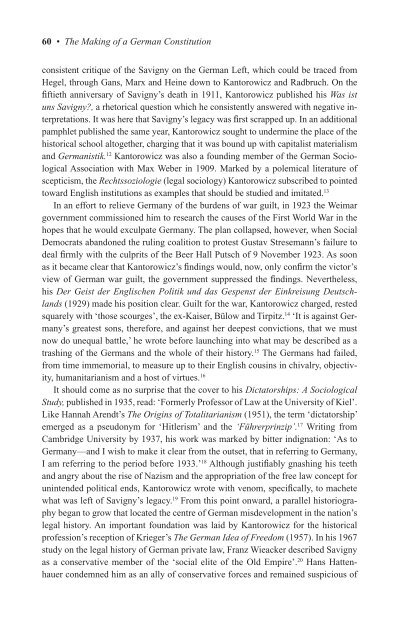Making of a German Constitution : a Slow Revolution
Making of a German Constitution : a Slow Revolution
Making of a German Constitution : a Slow Revolution
Create successful ePaper yourself
Turn your PDF publications into a flip-book with our unique Google optimized e-Paper software.
60 • The <strong>Making</strong> <strong>of</strong> a <strong>German</strong> <strong>Constitution</strong>consistent critique <strong>of</strong> the Savigny on the <strong>German</strong> Left, which could be traced fromHegel, through Gans, Marx and Heine down to Kantorowicz and Radbruch. On thefiftieth anniversary <strong>of</strong> Savigny’s death in 1911, Kantorowicz published his Was istuns Savigny?, a rhetorical question which he consistently answered with negative interpretations.It was here that Savigny’s legacy was first scrapped up. In an additionalpamphlet published the same year, Kantorowicz sought to undermine the place <strong>of</strong> thehistorical school altogether, charging that it was bound up with capitalist materialismand <strong>German</strong>istik. 12 Kantorowicz was also a founding member <strong>of</strong> the <strong>German</strong> SociologicalAssociation with Max Weber in 1909. Marked by a polemical literature <strong>of</strong>scepticism, the Rechtssoziologie (legal sociology) Kantorowicz subscribed to pointedtoward English institutions as examples that should be studied and imitated. 13In an effort to relieve <strong>German</strong>y <strong>of</strong> the burdens <strong>of</strong> war guilt, in 1923 the Weimargovernment commissioned him to research the causes <strong>of</strong> the First World War in thehopes that he would exculpate <strong>German</strong>y. The plan collapsed, however, when SocialDemocrats abandoned the ruling coalition to protest Gustav Stresemann’s failure todeal firmly with the culprits <strong>of</strong> the Beer Hall Putsch <strong>of</strong> 9 November 1923. As soonas it became clear that Kantorowicz’s findings would, now, only confirm the victor’sview <strong>of</strong> <strong>German</strong> war guilt, the government suppressed the findings. Nevertheless,his Der Geist der Englischen Politik und das Gespenst der Einkreisung Deutschlands(1929) made his position clear. Guilt for the war, Kantorowicz charged, restedsquarely with ‘those scourges’, the ex-Kaiser, Bülow and Tirpitz. 14 ‘It is against <strong>German</strong>y’sgreatest sons, therefore, and against her deepest convictions, that we mustnow do unequal battle,’ he wrote before launching into what may be described as atrashing <strong>of</strong> the <strong>German</strong>s and the whole <strong>of</strong> their history. 15 The <strong>German</strong>s had failed,from time immemorial, to measure up to their English cousins in chivalry, objectivity,humanitarianism and a host <strong>of</strong> virtues. 16It should come as no surprise that the cover to his Dictatorships: A SociologicalStudy, published in 1935, read: ‘Formerly Pr<strong>of</strong>essor <strong>of</strong> Law at the University <strong>of</strong> Kiel’.Like Hannah Arendt’s The Origins <strong>of</strong> Totalitarianism (1951), the term ‘dictatorship’emerged as a pseudonym for ‘Hitlerism’ and the ‘Führerprinzip’. 17 Writing fromCambridge University by 1937, his work was marked by bitter indignation: ‘As to<strong>German</strong>y—and I wish to make it clear from the outset, that in referring to <strong>German</strong>y,I am referring to the period before 1933.’ 18 Although justifiably gnashing his teethand angry about the rise <strong>of</strong> Nazism and the appropriation <strong>of</strong> the free law concept forunintended political ends, Kantorowicz wrote with venom, specifically, to machetewhat was left <strong>of</strong> Savigny’s legacy. 19 From this point onward, a parallel historiographybegan to grow that located the centre <strong>of</strong> <strong>German</strong> misdevelopment in the nation’slegal history. An important foundation was laid by Kantorowicz for the historicalpr<strong>of</strong>ession’s reception <strong>of</strong> Krieger’s The <strong>German</strong> Idea <strong>of</strong> Freedom (1957). In his 1967study on the legal history <strong>of</strong> <strong>German</strong> private law, Franz Wieacker described Savignyas a conservative member <strong>of</strong> the ‘social elite <strong>of</strong> the Old Empire’. 20 Hans Hattenhauercondemned him as an ally <strong>of</strong> conservative forces and remained suspicious <strong>of</strong>




